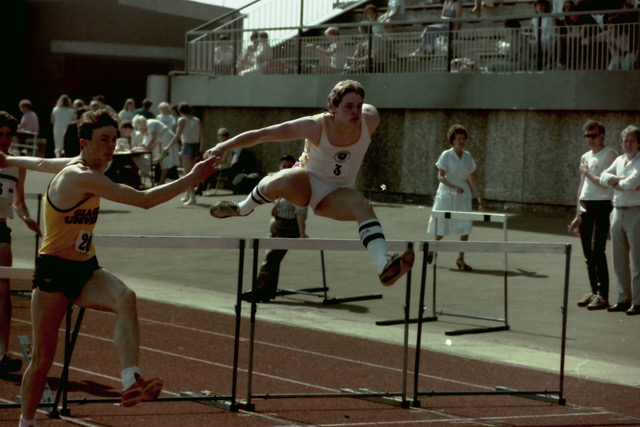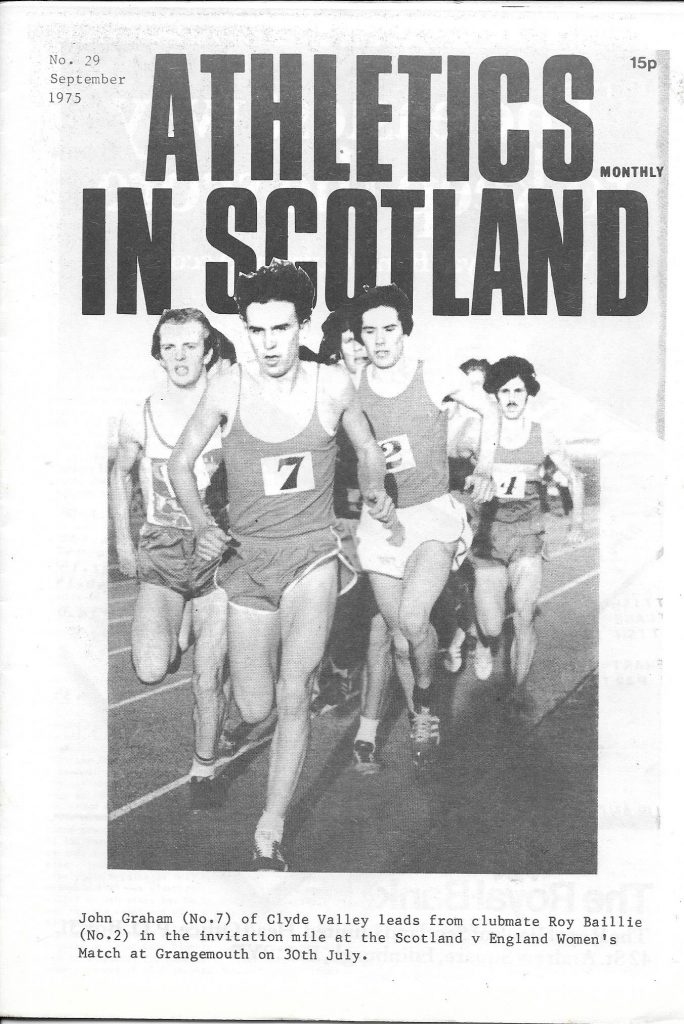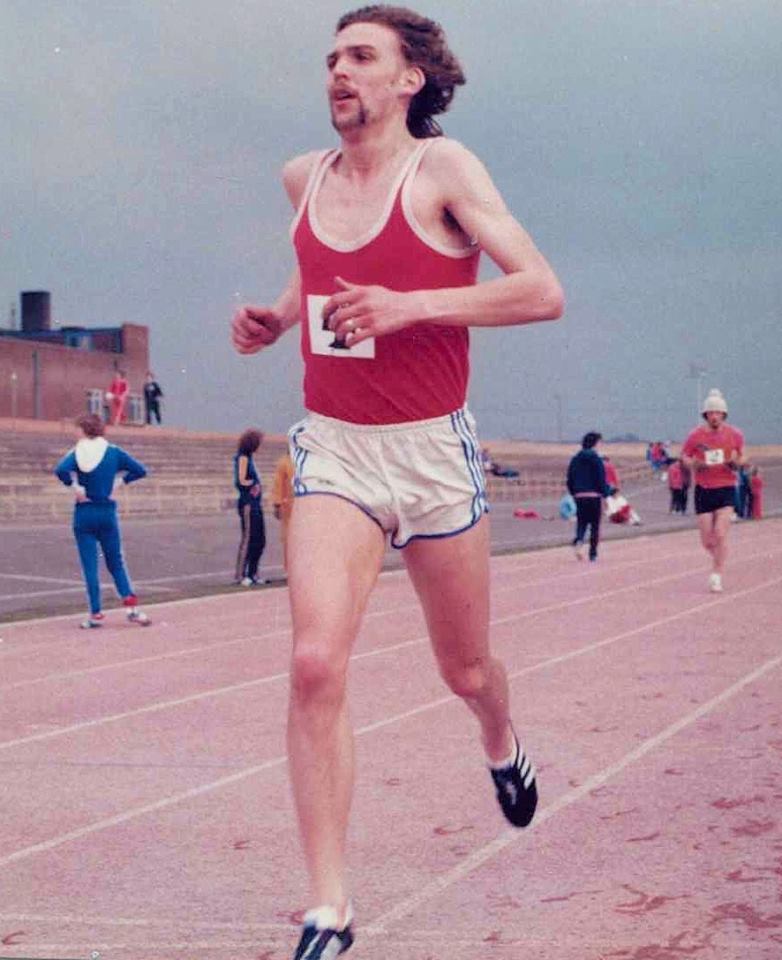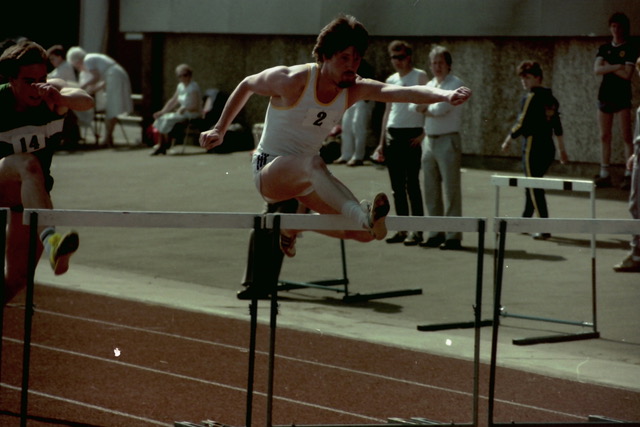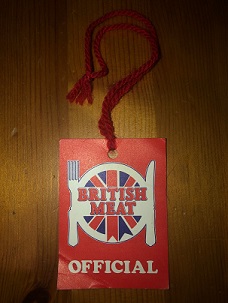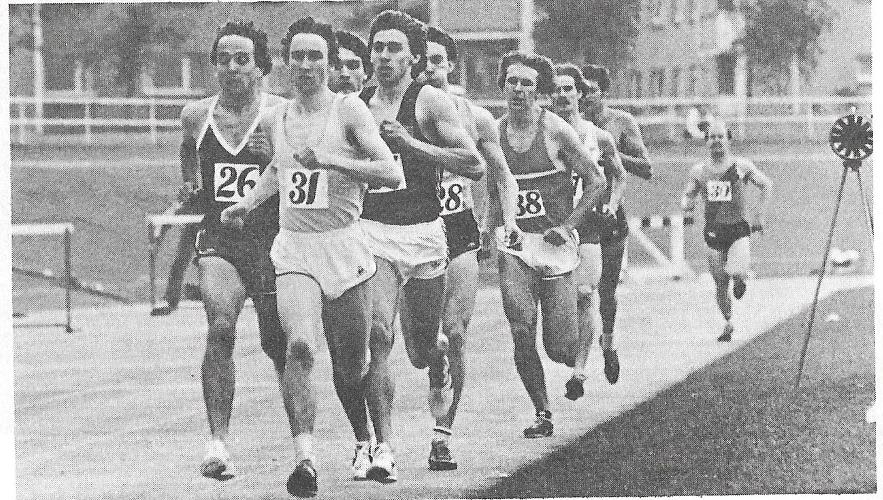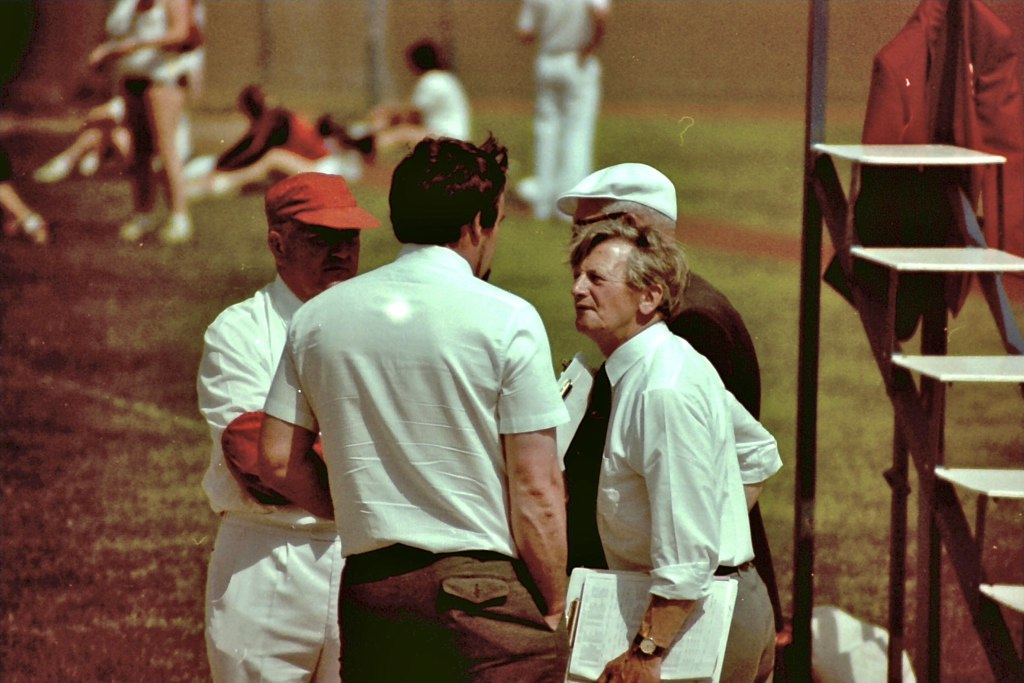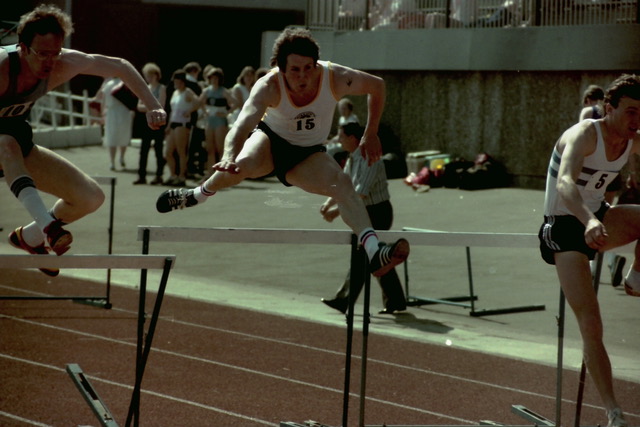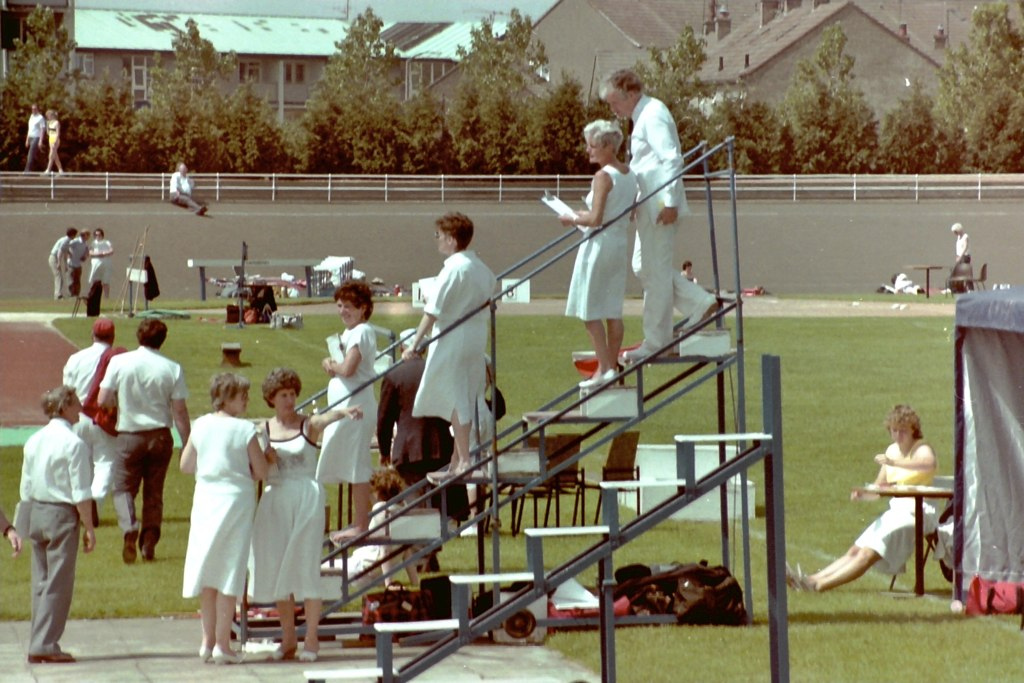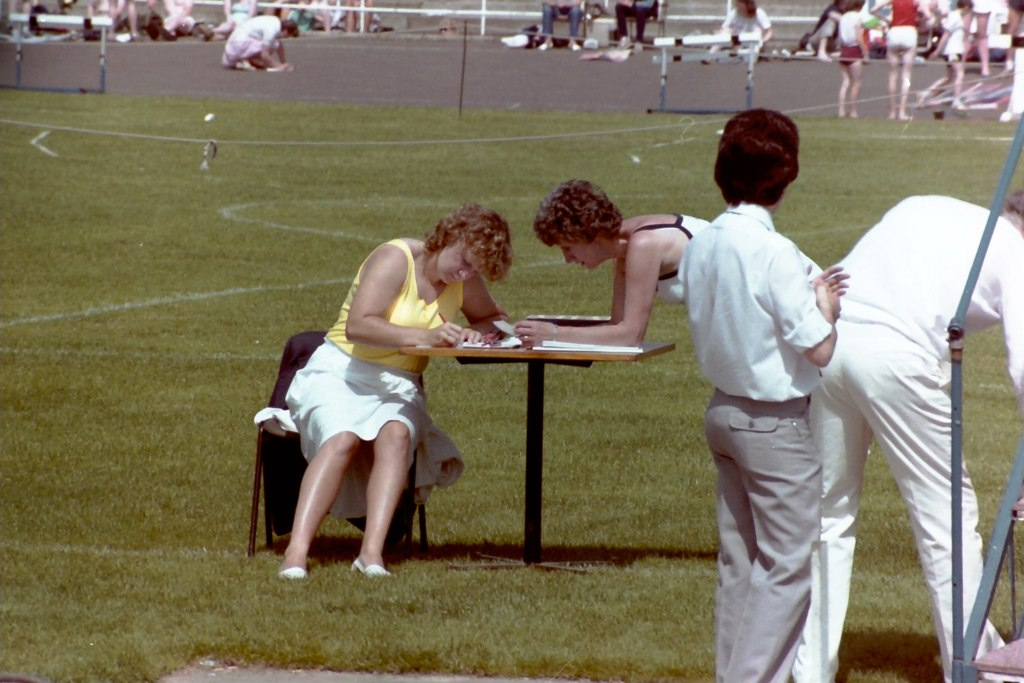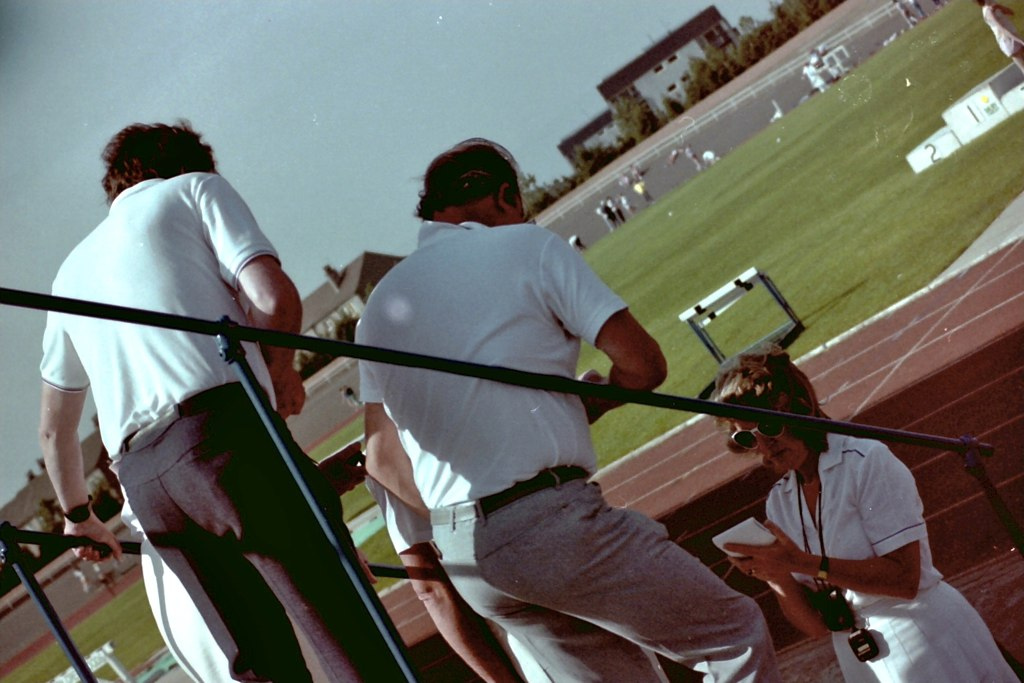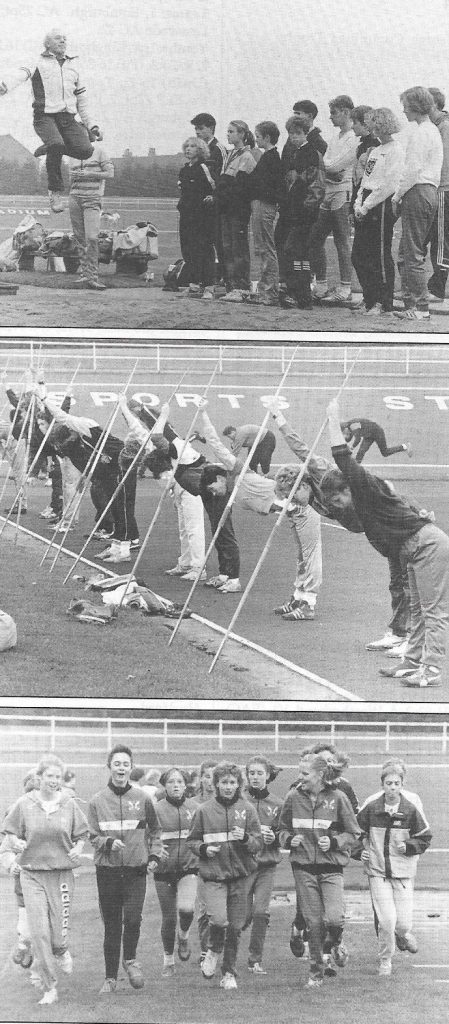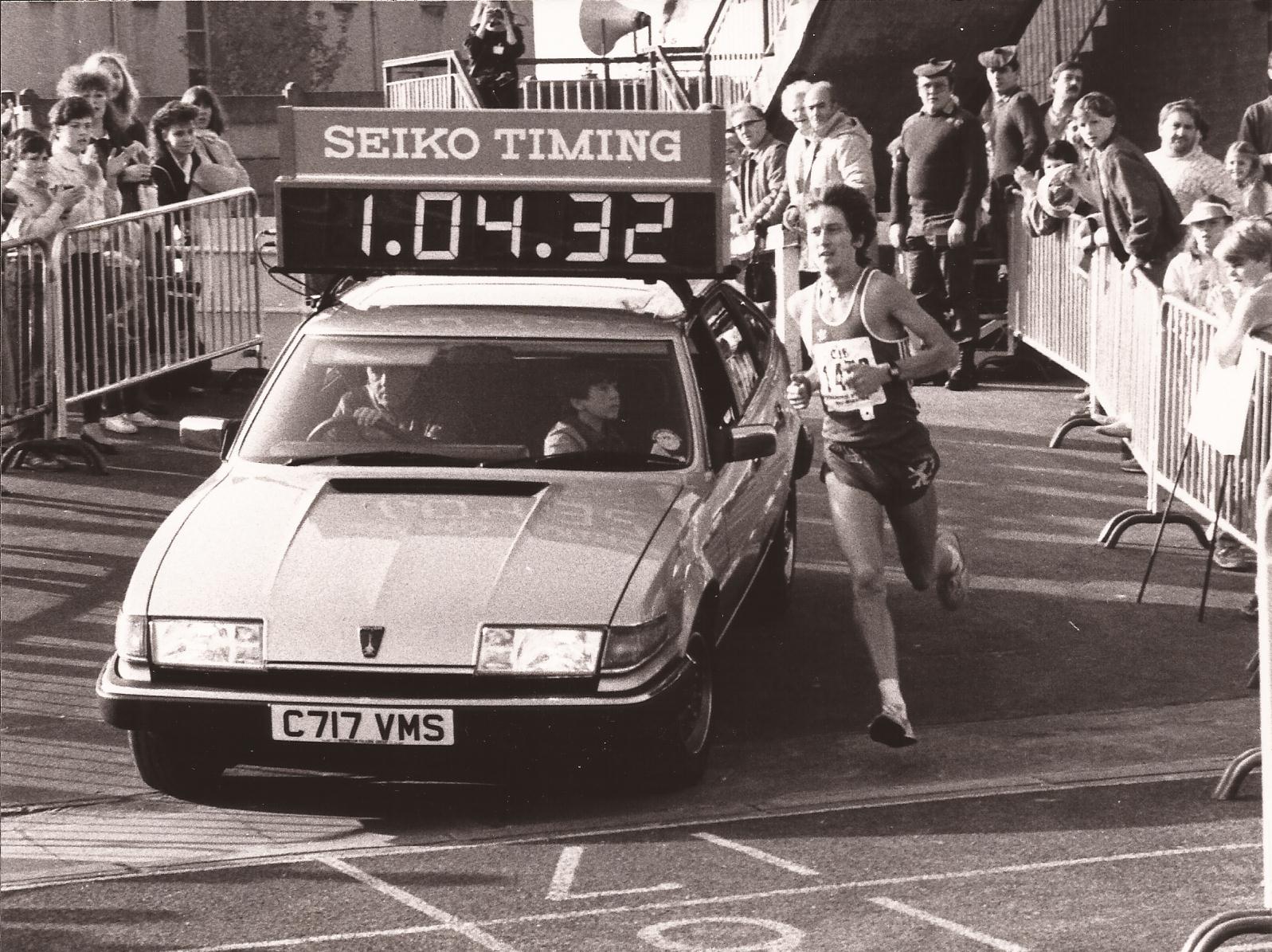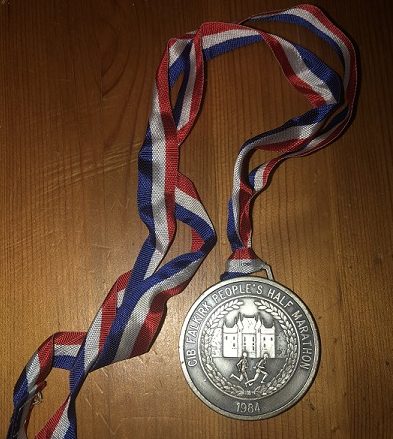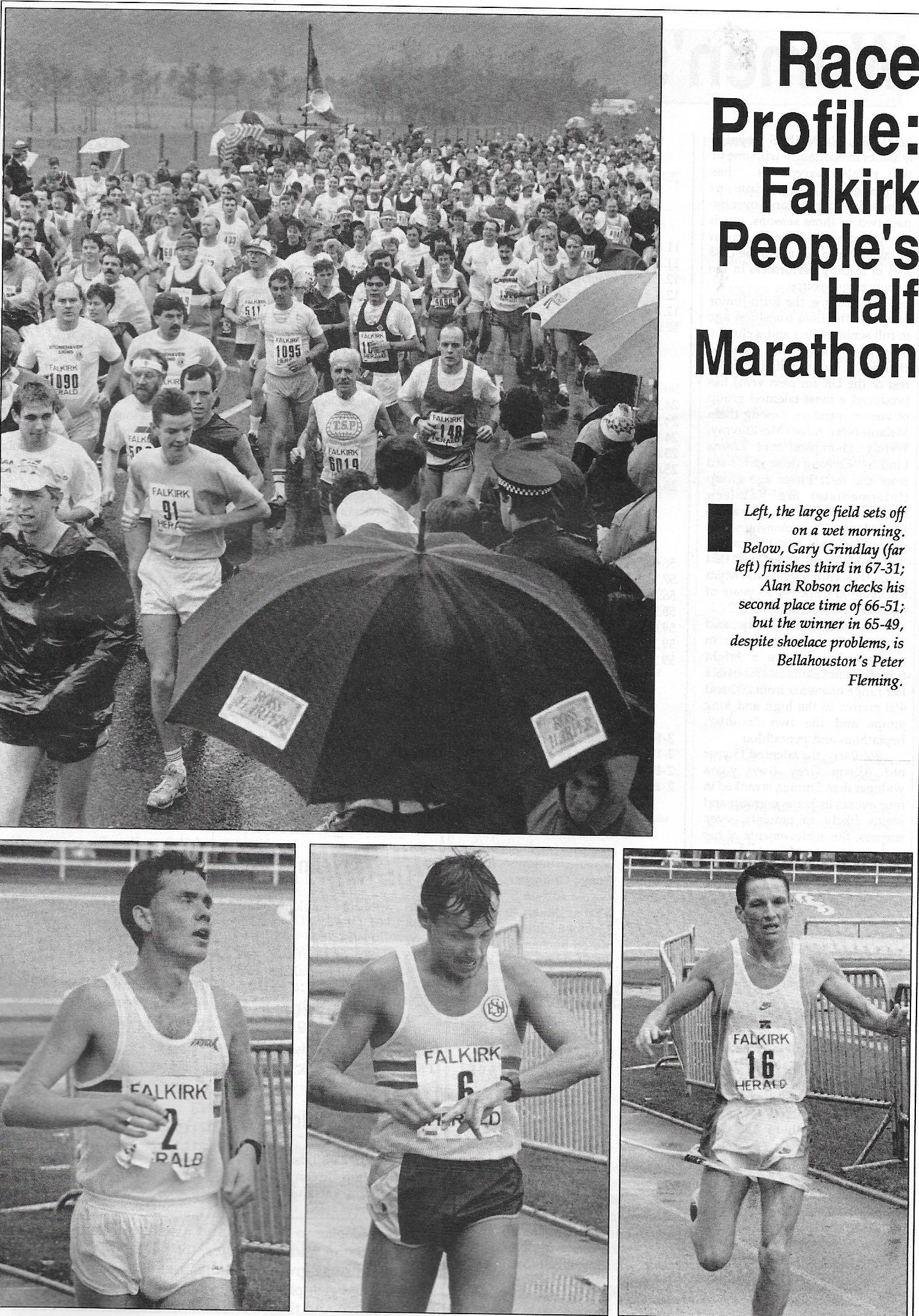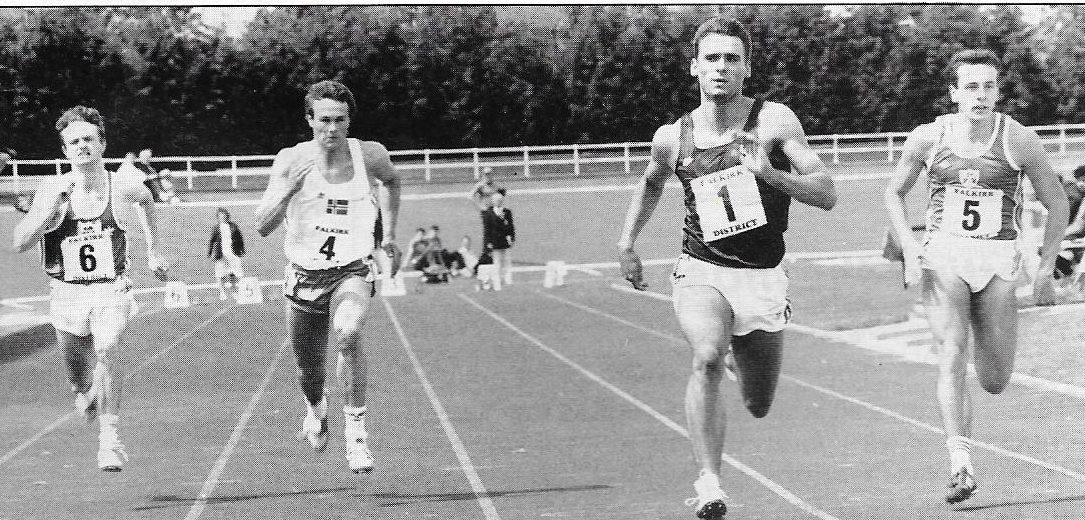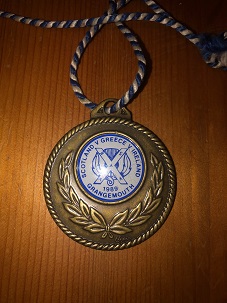Grangemouth, 1985, showing a hurdles race ‘going the wrong way’ and, outside the track. the cycle track.
You would have searched in vain for a Grangemouth fixture at the start of the summer season in 1975 with the top fixtures going to Meadowbank and Pitreavie. It was noted at the start of this account that the original track at Grangemouth Stadium had been RubKor and was a black colour, but in 1975 the track was upgraded and a new red, rubber surface laid which not only looked better but was reckoned to be even faster. In fact a former National Coach for Scotland said in print that it was the fastest track in Britain. The championships by now had bedded down in Meadowbank and most internationals were held there. Detailed results of winners at all championships noted here can be found at Arnold Black’s website – www.scotstats.net .
However the new track hosted an international fixture on 30th July. It was previewed in the Glasgow Herald of 28th July.
Donna Murray, probably the British woman athlete with the greatest spectator appeal these days, will grace the opening of Grangemouth Stadium’s new tartan track on Wednesday evening as part of an international match between Scotland and England. Falkirk District Council join the welcome band of athletics sponsors by financing the meeting but either they, or the Scottish women’s AAA have been remiss in distributing information about the meeting. It would be a pity to organise what appears to be an engrossing contest and then having only a few locals turning up to watch. The English team is not the strongest that could have been selected but Miss Murray hopes to have a fast 200m against Helen Golden, the British champion and record holder. Among other well known contestants will be Mary Stewart, the British 1500m champion, Myra Nimmo, in the long jump, and Christine McMeekin in the 800m.”
The Scottish team was defeated 98 – 59 despite having some very good athletes indeed competing including Helen Golden, Myra Nimmo (long jump), Meg Ritchie (discus) and Margaret Coomber (800). The English team had Val Peat, Donna Murray, Ann Yeomans and Pam Lloyd. Each team had a relay victory with England winning the 4 x 100, and the Scots the 4 x 400m. The Scots won the events indicated but Helen Golden was second to Peat in the 100m and did not turn out in the 200 which was won by Murray who, of course, won the 400m hurdles.
The first notable meeting at the track in 1976 was on 1st May when the SWAAA West District Championships took place. It was cold with a strong wind – conditions that did no one any favours and almost guaranteed slow times. However there were execptions – Ann Robertson won two events (200m and 400m) and set a record in the 400 with her time of 55.9. Alice Linton also set a record in the intermediate 800m of 2:17 and another intermediate, Irene Anderson, set a 400m time of 57 seconds. Top club was Glasgow LAC which won 53 medals, nearly half of those available. Almost exactly a month later, 5th June, the SWAAA Junior and Inter championships were hosted by the Stadium and among the talents on view were Ann Dalton, Irene Anderson, Irene Reynolds and Carol Lightbody who all won two events.
The SWAAA District Championship returned on 7th May, 1977, and it was another day of strong, gusting winds. Events were held in all age groups – Seniors, Inters, Juniors, Girls – with many of the best athletes in the country competing. Among the senior winners were Lynette Boyle (100), Wilma Addison (200), Ann Robertson (400), Carol Lightfoot (800m), Christine McMeekin (1500), Judith Shepherd (3000m) Joyce Pinkerton (HJ), Lorraine Watt (LJ), Chris Chalk (shot) and Heather Thomson (discus). Elsewhere on the day, winners included Inter Fiona McQueen (800 and 1500), Junior Kaye Jeffrey (100 and 200), and Yvonne Anderson among the Girls. The arena was used quite a lot for such as league matches: eg there was one at the end of May (28th) in which Glasgow LAC won the opening British League match defeating Feltham AC, Mitcham, Enfield, Derby and Notts. The SWAAA Girls Championships were held on 11th June at Grangemouth and among the winners was 12 year old Lynne McDougall who won the 800m in 2:26.8. The 1977 season however came to a close on 10th September with an invitation meeting and it really was a good meeting. Results in the following table, note the quality performers, note the number of close finishes.
| event | winner | performance | second | performance |
|---|---|---|---|---|
| M 100 | R Denham | 10.7 sec | J Wilson | 10.8 |
| M 300 | A Sumner | 35.9 | J Wilson | 36.0 |
| M 800 | P Forbes | 1:52.8 | T Young | 1:53.4 |
| M 3000 | I Orton | 8:24.1 | A McIntosh | 8:31.2 |
| M 400mH | A Sumner | 56.3 | R Caldwell | 56.8 |
| M High Jump | R Hepburn | 1.85 | D Hendry | 1.80 |
| M Heavies | R Davidson | 12 pts | W Weir | 11 pts |
| event | winner | performance | second | performance |
|---|---|---|---|---|
| W100 | E Sutherland | 11.7 | F Nixon | 11.8 |
| W300 | E Sutherland | 38.6 | F Nixon | 38.6 |
| W800 | A Clarkson | 2:13.6 | C Lightfoot | 2:13.6 |
| W100mH | F McAuley | 14.6 | J Lindsay | 15.2 |
| W HJ | M Walls | 1.71 | J Pinkerton | 1.68 |
| W LJ | M Walls | 5.91 | F McAuley | 5.54 |
John Graham in the steeplechase, 1975
1978 was a Commonwealth and European Games year. There was a purely Scottish team in the former, the venue was Edmonton and ‘making the team’ was a game that many athletes were involved in: especially those who might not be selected for the British team in the latter. The first meeting at Grangemouth was SWAAA West District Championships on 6th May. Winners this time were Ann Dalton, Lynette Boyle Ann Harley (formerly Robertson), Evelyn McMeekin, Judith Shepherd, Janet Higgins, Christine Chalk, Rhona Pinkerton, Heather Yule and Kaye Jeffrey. The times were all fairly good too. Later in the month, on 27th, the women’s British League match saw some excellent performances from athletes from all over the United Kingdom. The outstanding athlete was Sharon Colyear who won three events – the 100 metres, 100m hurdles and long jump, while Meg Ritchie won two events – shot and discus. Other senior winners were Evelyn McMeekin (400n), Christine McMeekin (800m), Paula Fudge (1500), Ann Ford (3000) and Joyce Pinkerton (high jump).
There was a Scottish women’s league match on 17th June at the stadium and again there were some good performances with Margo Wells setting the fastest time of the season for 100m of 11.6 seconds. Glasgow won the match from Edinburgh SH by only one point – 519 to 518 with Shettleston third on 451. A week later on 24th June, the SWAAA age group championships took place at Grangemouth with many talented youngsters taking part – Lynne McDougall won the Junior Girls 1500m in 4:46.5, Pat Rollo won the Inter hurdles and Ann Reid won both 100m and 200m as an Inter.
All hurdles pictures by Alastair Shaw
International athletics returned to Grangemouth in July, 1979. By now there were several all-weather tracks in Scotland – there were the established venues of Grangemouth and Meadowbank, to which could be added Pitreavie, Coatbridge and Bellahouston in particular. The regular competition for the British Isles Cup was no more and what international (or even representative) matches there were had to be farmed out to a wider range of venues. At the start of June, 2nd, the SWAAA Junior and Intermediate championships were held and resulted in seven records being set. Ron Marshall’s report in the Glasgow Herald read as follows: “Seven records fell despite a strong wind at Grangemouth on Saturday. Six of them were in the Intermediate (under 17) group where, as expected, Linsey MacDonald dominated in the sprints, setting two records, 11.9 seconds in the 100m into a slight breeze and 24.1 seconds in the 200 with the headwind a stiff 4.2 metres a second. The middle distance running of two Shettleston girls also suggests an exciting future. Annie Reid clipped the 800 metres record by 0.4 of a second in a time of 2 minutes 12.8 seconds, and Andrea Everett, whose father Graham coaches them both, won the 1500 metres in 4 minutes 43.1 seconds, 2 1/2 seconds better than the previous best, and but for the wind these both might have been several seconds faster. But the wind aided the long jump where both the intermediate and junior best performances fell, the latter to Glasgow’s Yvonne Anderson who also won the 100 metres. And another double winner, Sandra MacDonald of Pitreavie, set new shot putt figures of 12.14 metres in addition to winning the discus.” It is worth noting the Lynne McDougall won the junior 1500m in 4:52.4 despite the weather.
The biggest meeting to come for some time, however, was on 16th June when the British Meat Scottish Championships took place at the stadium. Just look at some of the results. In the men’s 100m, the first three were Wells, McMaster and Sharp (winning time 10.0); in the men’s 800m it was McGeorge, Williamson and Forbes (1:48.7); men’s 5000 it was Muir, Hutton and Jim Brown; Steeplechase was G Rimmer, Graham and McKim (8:52.7). On the women’s side, the 800 had Lightfoot, Hutton and Clarkson (2:10.7), the 1500 had Coomber, McQueen and Hope (4:27.0); 3000m had Shepherd, Robinson and McLaren. The truth is that there was quality all the way through the match. If the times were not world beating, remember that it is Scotland and on the day there was a blustery wind which hampered field events performances and did not help the distance runners at all. The 400m champion was Ian Cuthbertson from Pitreavie and he returned to the track the following week for the Junior championships. He won the 400m in 47.8 and later took the 200m as well in 22.3 Other winners on the day included David Kirk from Dumbarton in the 800m (1:54.0), and Colin Hume (ESH) who defeated Alistair Douglas of Victoria Park in the 1500m.
The next meeting of consequence at Grangemouth that year was on 7th July when the women took on and defeated Norway and Greece. Again there were several stars on display. Linsey MacDonald won both 100m and 200m (11.6 and 23.7), Sofia Sakafora of Greece threw the javelin an Olympic qualifying distance of 58.02m but the best known athlete on the day was Grete Waitz of Norway who won the 1500m from Margaret Coomber in 4>15.8. The final British women’s league match of the season was held at Grangemouth on 25th August and was won by Glasgow from Edinburgh Southern with Stretford third of the clubs taking part. Glasgow’s stars were the McMeekin twins who swapped events – Evelyn winning the 1500m and Christine being second to Gillian Dainty in the 800m; Fiona McQueen won the 3000m while Meg Ritchie and Moira McGuire won their events for Southern.
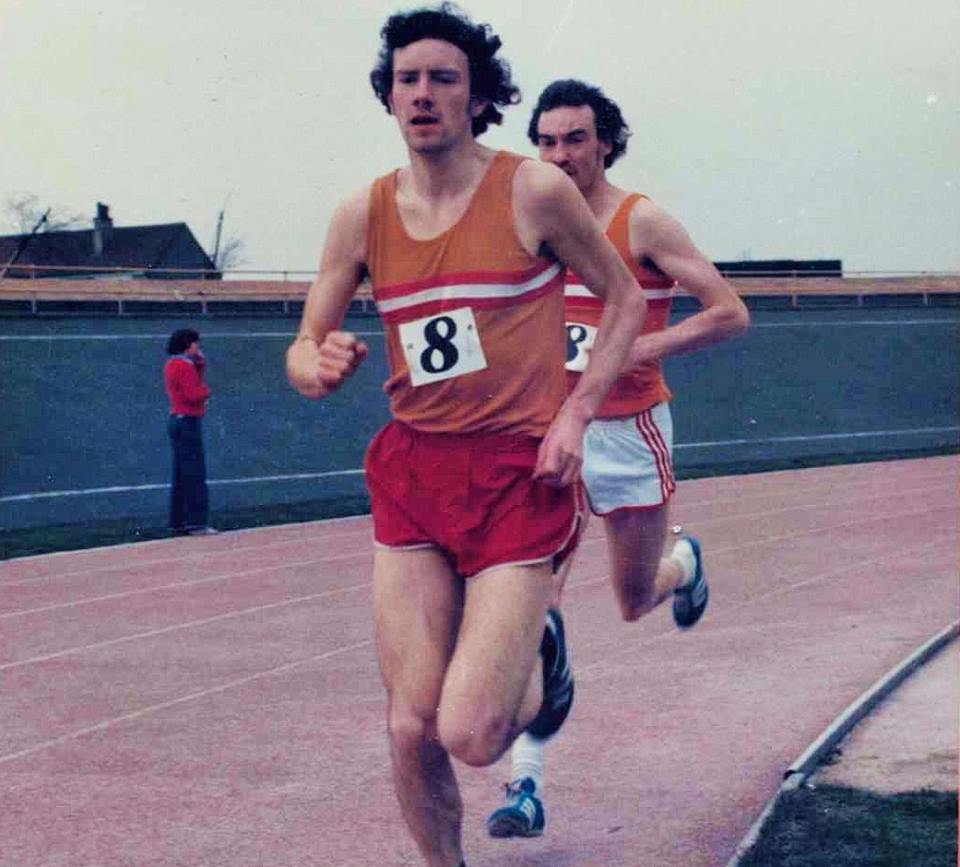 This photo plus the one of John Graham by Alex Miller
This photo plus the one of John Graham by Alex Miller
On 25th May in 1980, Grangemouth hosted the Falkirk British Airways Games and a great success it was too. Paul Forbes had just ended a year suspension for misbehaving at the Commonwealth Games in Canada and he celebrated on the track in fine style. He won the 800m in 1:48.5 defeating Graham Williamson in the process. It was his fastest time for two years. It came one day after he had almost beaten Steve Ovett in Belfast where he had been leading Ovett by two yards with just under 60m to go. Ovett’s strength told and Forbes had to settle for second but it was the start of a brilliant two days for the Edinburgh man. Linsey MacDonald won the women’s 100m from a good field in 11.5, Peter Little won both 100 yards and 200m races (9.9 and 21.2) and Chris Black won the hammer (60.5 metres) one day after competing in all four throws for his club in a British League match. The bread-and-butter matches continued of course – eg on 28th June the women’s British League match took place with the Scots clubs taking fifth and sixth places. Margot Wells won both 100 and 200m races, Meg Ritchie the discus and Alison Wright the 3000m.
1981 started with the SWAAA pentathlon championships on the 8th and 9th May being the first major meet of the season at Grangemouth. The winner was Shona Urquhart from Fife who had just returned from three weeks exchange visit to America and she as a consequence hadn’t trained for that period. Coached by Eric Simpson, she won comfortably from Angela Wallace of Gosforth. The intermediate competition was won by Sarah Booth of Central Region AC. 16 year old Lynn MacDougall was the star turn on 16th May when in the East v West Match, she won the Inter 800m in 2:10. Other notable winners were Linsey McDonald (100m/200m), Angela Bridgeman (400m) and Ann Clarkson (1500m).
John Robson, 1981
May Day, 1982 saw the SWAAA Western District Championships held at Grangemouth in a strong wind. This was no hindrance to Angela Bridgemen (Glasgow) who won no fewer than three events – 110m (11.3), 200m (23.7) and 400m (56.8). Caroline Shaw of Ayr Seaforth won the javelin with a championship best performance of 36.72 metres.
The first week end in June was a big one for the stadium: on the Saturday it was the SWAAA Intermediate championships and since 1982 was a Commonwealth Games year, results were important for young hopefuls. The report in the Glasgow Herald was enthusiastic about the chances of 16 year old Ann Girvan saying that if she were not selected, it would not be for want of trying. A member of Ayr Seaforth who lived in the North of England, she set two records at the meeting winning the 100 hurdles in 13.7 seconds and the 200m hurdles in 27.8 seconds. She had been third in the WAAA championships the previous weekend. There were seven other records broken – in the 1500m Vicki Vaughan of Pitreavie took 7 seconds off the junior record with a time of 4:39.4, which was only 1.4 seconds slower than clubmate Karen Hutcheson did in the Intermediate race which was also a record. Carol Candlish set a record in the 400m (55.7) and Jackie Barclay of Shettleston won both shot and javelin setting a record in the latter of 41.94m. Dawn Flockhart (ESH) won both 100 and 200m and Elaine Thomson of Glasgow set a junior high jump record of 1.66m. A day later and the qualifying rounds of the GRE Cup were held on Sunday, 6th June, and both men’s and women’s club teams were in action. In the women’s match Central Region (111), Kilbarchan (98) and Ayr Seaforth (96) were the three qualifiers, and in the men’s it was Pitreavie (142) and Aberdeen (127) who qualified.
The inimitable Jimmy Campbell, marksman, right holding the clipboard, 1986
The SAAA Juniors, Youths and Senior Boys championships were held at Grangemouth on 26th June, 1982, and there was only one record on a day with a very cold wind and that was from Craig Duncan (Shettleston) in the Youths triple jump (14.36m). Other good performances were returned by Alistair Currie from Dumbarton with an 800.1500m double, Elliott Bunney in the 100/200m in the Youths age group, in the Senior Boys competition there was a double for Malcolm McPhail (200/400m), and in the Senior Boys David Boyd won the 800/1500m double. Among the Juniors, David Martin of Enfield won both sprints, Martin McMahon won the 400m, Tom McKean the 800, Stuart Paton the 1500m and W Gemmell the steeplechase. There were mixed fortunes for two of the winners the next day at Coatbridge in the League match – McMahon (an Anglo from the North of England making his first appearance for ESH won the 400m while Bunnery ran in the relay but the team was disqualified isnce Bunney was a Youth who had not run the senior qualifying time.
The joint SAAA/SWAAA Championships returned to Grangemouth on 10th July and there were several new faces taking part. In the womens events Sandra Whitaker won both 100m and 200m and Angla Bridgman the 400m to make it three titles for coach Iain Robertson who coached them both. Carol Lightfoot won the 800m and 17 year old Lynn MacDougall the 1500 in 4:16.2. This was inside the meeting record, the Scottish Native Record and just missed the UK Junior record. Yvonne Murray won the 3000m and Pat Rollo th sprint hurdles; in the field events Meg Ritchie won the shot and discus and Lorraine Campbell the long jump. As far as the men were concerned, there was a proliferation of Rnglish based athletes among the prize winners. Allan Wells won the 100m and Tom McKean the 800m with Rob Harrison (Birchfield) taking the 800m, Geoff Turnbull (Valli) winning the 1500 and Nat Muir the 5000m. It was at the happy time when the marathon was run from the championships and Colin Youngson took the title. The team for the Commonwealth Games was announced on 14th August and Ann Girvan was indeed in the team – but Margot Wells who was one place above her in the rankings was not.
This was followed by the British Airways Games the following week with a multitude of stars taking part. The results indicate as much. For instance, Cameron Sharp, who had beaten Allan Wells over 200m the previous weekend, equalled the Scottish native, national and all-comers record for the 100m set by Wells of 9.6 seconds: he had led all the way but was almost caught on the line by Drew McMaster who was given the same time. Others to excell were Yvonne Murray who had set a new native record for the 3000m the week before, beat the record of Lynne McDougall with 4:15.1 after a great race with Kathy Mearns, Ann Clarkson who defeated Lynn McDougall in the 800m and Angela Bridgeman beat Kaye Jeffrey in the 100m and Anglo Natalie Byer in the 200m. Among the men, Jim Dingwall won the 3000m, Nat Muir the 1500m, Martin McMaahon the 400m and Geoff Parsons the high jump, and Chris Black the hammer.
Of course the bread and butter meetings went on – on August 21st, for instance, there was a Young Athletes League meeting was held and at the start of September there was a Scottish Women’s League match where Shettleston defeated Glasgow LAC. Falkirk’s sponsorship of the arena and its meetings had paid off again.
The new season started on 7th May 1983 with the SWAAA West |District Championships. There were four records set, three of them in the field events: Rhona Pinkerton in the high jump with 1.75m, two Shettleston Harriers Ladies in the throws (Morag Ross and Jackie Barclay who threw the identical distance of 43.16 in setting new records for the discus and javelin) and Fiona McQueen broke the existing record for the 1500m by almost 7 seconds in 4:27.2, well clear of Carol Lightfoot. Lightfoot had just lost in a close finish in the 800m to Lynn McDougall whose time was 2:09.9. To complete the middle distances, Susan Crawford of Kilbarchan won the 3000m in 9:50.7. The only double winner was Sandra Whittaker who won the 100m and 200m. It was a good week end for followers of women’s athletics living in Grangemouth for the East District championships took place at the same stadium one day later on Sunday 8th May. 18 year old Yvonne Murray had a double victory when she won the 800m from Liz McArthur in 2:09.3, and 1500m in 4:29.1. The other double winner from the East were Dawn Flockhart in 100m and 200m.
Scottish and British athletics were on a real high at this time with many top class athletes – male and female – competing all over Europe almost on a weekly basis. Even League matches had their share of international athletes competing. In addition there were many more good facilities with every field event provided for and all weather tracks available within Scotland. There were no more big meetings at Grangemouth in 1983 but the sport went on. For example, towards the end of the season the final Scottish women’s league match was held there with Edinburgh Southern finishing third on the day but winning the league title. Among the athletes taking part were Sandra Whittaker, Angela Bridgeman and Jane Lindsay.
Into 1984 and on 5th May the West District SWAAA Championships were held there while the East were held at Pitreavie. THree double winners made their presence felt at Grangemouth – Kaye Jeffrey won the 100 in 12.2 (from Sandra Whittaker) and the 200m in 25.00; Moira McBeath won the long jump (6.02m) and 100m hurdles (15.10); and Andrea Everett took the 1500m (4:40) and the 3000m in 9:56.9. Carol Sharp won the 800m in 2:13.7 just a few weeks after a cartilage operation. Thereafter the season proceeded with all sorts of matches (Scottish League, British League, You ng Athletes) and training weekends but, it being Olympic year many of the top stars rationed their appearances to those events where their chances of selection-worthy performances were highest and Grangemouth didn’t really figure when there were Grand Prix meetings all over Europe, invitation meetings in London and other capital cities. For the meetings left in Scotland there was competition from Meadowbank, Pitreavie and Coatbridge as well as the newer tracks such as Dundee’s Caird Park track. There was a Scottish Championship on 21st July when the SWAAA Pentathlon was held there, the winners being Sarah Booth of Centrl Region, and the junior winner was Michelle McGuinness of Colzium. The Olympic athletes were back for the end of the season when Edinburgh Southern, despite finishing second on the day, won the Scottish women’s league. Outstanding performers on the day were Glasgow’s Sandra Whittaker, and Jayne Barnetson from Inverness.
Another good photograph from Alastair Shaw of the track judges between races with the marksman apparently heading off across the grass and a great shot of the track with the cycle track providing informal seating and sunbathing with the outer banking and its trees at the top of the picture. [From the top: David Lyle, Dora Stephen, – , Eleanor Gunstone, Netta Sinclair. Also Jimmy Campbell]
On 27th April 1985 the Scottish Universities Cup was contested at at Grangemouth when Martin Johnson of Aberdeen University won three sprint races – the 100m, the 200m and the 400m in 10.7, 21.7 and 49.7. Decathlete Ben Thomson also won three events – the 110 hurdles, the long jump and high jump, leading Edinburgh University to the team title. Fiona Hargreaves, also of Edinburgh, was in outstanding form for the time of year, winning the 100m in 11.9 and the 200m in 24.6. A week later and the West District Women’s Championships took the stage with Sandra Whittaker winning the 100m (12.1) and 200m (24.2. Team mate Elspeth Turner won the 1500m (4:32.3). The only championship best was by Jackie Barclay of Monklands Shettleston in the senior javelin with a throw of 44.52m. Other winners were Carol Sharp (800m), Audrey Sim (3000m), Jane Low (100mhurdles), Moira McBeath (long jump), and Morag Bremner (shot and discus). A day later and the first meeting of the newly formed third division of the Scottish Men’s League took place and was won by Lothian AC from Lochgelly and District. The UK Women’s League Division Two fixture followed on Saturday, May 11th, and again Whittaker was the star of the show with another sprint double, Carol Sharp won the 800m, and Rhona Pinkerton won the high jump. Liverpool won the match from Glasgow.
The Schools returned to the venue for their pentathlon and relay championships and the winners included Elizabeth Dempsey from St Maurice’s at Cumbernauls from Caris Henderson from Forfar in the younger girls age group. Ian Easton from Castlehead High in Paisley won the U17 Boys championship and the younger boys was won by S Thomson of Morrisons Academy while the older girls event went to C Smellie of Bo’ness.
There was a GRE Gold Cup second round match at Grangemouth on Sunday 16th June where Cameron and Carol Sharp both won their respective events. In the men’s match, Cameron won the 100m in 10.3 and the 200m in 21.0 which was the fastest legal hand timed 200m in the UK that year up to then. Despite this, Shettleston could only finish third and coule not qualify for the next round. The Ladies club did qualify, helped by Carol who won the 1500m in 4:30.1. Mary Anderson was a double winner, taking the shot putt and the javelin throw. A month later, 13th July, the SWAAA Junior and Intermediate Championships were held there. Edinburgh’s Mary Anderson was one of the stars of the show when she won Shot Putt (14.40m) and the Javelin (45.90m) and was second in the Discus (40.80m) but left before the presentation to the athlete of the meeting was made. Gail McDonald of Glasgow had been second in the SWAAA Senior Championships in June, and here she won the 1500m by 13 seconds in a time of 4:32.8. She was beaten in the 800m by Edinburgh’s Linda Purdon who won in 2.13. The high jump was won by Inverness’s Jayne Barnetson with 1.80m, and she also won the long jump with 5.56m. Among the Inters, Joan Booth won both 100m (12.5) and 200m (25.1) which helped her win the Golden Wonder Trophy. By the end of the summer both of the two top teams in the country – Edinburgh Woollen Mills and McLaren Glasgow – had their own sponsors and were in the top tier of the British Women’s League. But when it came to the domestic League, EWM again came out on top after the final match at Grangemouth on 31st August with a sprint double by Kay Jeffrey.
Netta Sinclair dictating confirmed result to Carole Shaw
In 1986, there was a UK Women’s League Match on 5th July with a host of internationalists taking part in the year that Scotland would again host the Commonwealth Games. Among the winners were Lynne McDougall, Ann Putvis, Andrea Everett, Marsella Robertson, and Lorraine Campbell. There was good class competition all through the field too. The next meeting of consequence at the arena was on 21st June when the SSAA schoolgirls championships were held there featuring such as Hayley Haining, Alison Grey and Nikki Barr.
The photographs of the officials on this page were all taken by Alastair Shaw at the Inter and Junior championships on 28th June, 1986. It was earlier than usual because of the Commonwealth Games that year and the pictures show the officials, without whom the meeting could not go ahead, but also segments of the track and the layout of the stadium. There is the infield, then the track, then the cycle track which is used for close up spectating by the supporters, families and coaches, then on the outside is the raised banking for the spectators. It is a good track with many attractions for the spectators. The water jump for the steeplechase was moved from the first bend to inside the second bend so that the finish is at the ‘normal’ finishing line in front of the stand. Among the winners this time round were Nicola Emblem (Javelin) and Nicola Barr both set records – Emblem in the javelin with 44.94, and Barr in the inter long jump with a best of 5.72m. Emblem also finished second in the high jump.
By now there were many new tracks around the country – the track in Inverness had been opened in May 1985 – and there were good quality facilities all across the country (Aberdeen, Coatbridge, Crown Point, Pitreavie, Ayr, etc) but Grangemouth was one of the best and while not holding as many big meetings as before, was still in action every week end as well as for training throughout the week.
Hilda Everett noting the times from Tom Bolan (Colzium) (top) and John Robertson (ESH)
We can maybe get an indication of the hive of activity that was Grangemouth Stadium by looking at a range of the type of event hosted there. Remember, first, that it was being used through the week for club training purposes by many clubs but mainly Falkirk Victoria Harriers, and second that this is an indicative list and not a comprehensive one.
| Date | Meeting |
|---|---|
| 23/3/87 | Falkirk Council Open Graded Meeting |
| 4/4/87 | Colzium AAC Open Inter-Club Fixture |
| 12/4/87 | Perth Strathtay Harriers Open Meeting |
| 3/5/87 | Bank of Scotland Women's Athletic League Cup Semi Final |
| 10/5/87 | UK Access Women's League |
| 13/5/87 | Combined Scottish Universities v Scottish League v SAAA Junior Select |
| 24/5/87 | SWAAA Combined Events Championships and Relay Championships |
| 14/6/87 | Scottish Schools Pentathlon and Relay Championships |
| 20/6/87 | Scottish Schoolgirls Championships |
| 8/7/87 | Falkirk Council Open Graded Meeting |
| 13/9/87 | Women's Own/Nike 10K from Grangemouth Stadium |
That should give an idea of the width of coverage – local open meetings, club sponsored events. schools and age group champonships, national championships and even as a starting and finishing point for road races. And note the pictures below- taken at a Scottish Schools AA Coaching Day on 16th October, 1988. These days have been taking place at Grangemouth for as long as I can remember and are always staffed with some of the best coaches Scotland could provide. They are immensely successful functions.
We can maybe look at some of the events individually. But first note the pictures above – taken at a Scottish Schools AA Coaching Day on 16th October, 1988. These days have been taking place for as long as I can remember and are always staffed with some of the best coaches Scotland could provide. They are immensely successful functions.
The first notable meeting in 1987 was the Monklands Scottish Athletic Cup on 3rd May, and the star of the show as undoubtedly Yvonne Murray who won the 800m in 2:06.4 and then, in the 4 x 400m relay last leg, took over with a 25 yards deficit and finished first by 20 yards. In the field events, Ashley Morris of Pitreavie won the shot (13.04m) and discus (41.54m) with personal bests. A week later in the UK women’s league, Beverly Kinch, who had declined selection for the European and World indoor championships earlier in the year, won the 100 metres in 11.1 seconds with Birchfield winning the match from McLaren Glasgow, Borough of Hounslow and Wolverhampton and Bilston. In the representative match the following Wednesday, the SAAA Junior Select won with 230 points from the Scottish League who had 218 and the combined Scottish Universities a single point behind with 217. The combined events and schools championships went off with the customary Grangemouth efficiency. National championships continued to come to the stadium because the standard of the provision was so high – there was however only one drawback – the track only had six lanes at this point against the eight at Crown Point, Coatbridge, Pitreavie, Wishaw and the others.
Graham Macindoe’s photograph of Graham Crawford winning the Falkirk Half Marathon in 1985
We have been looking at Grangemouth Stadium as a hub of Scottish athletics and it has fulfilled that function well. Other stadia that were hailed as the answer to Scotland’s national stadium have come and gone. Meadowbank no more. Crown Point no more – well it is used by Shettleston Harriers but as a national stadiun it is no more. Scotstoun no more – can’t host an international because field event facilities are not up to scratch. But there is more to Grangemouth for athletes than the track – it is a favourite venue for road races. The Round the Houses race at the start of the year has been running for decades attracting some of the best talent in the country. Graham Crawford was a wonderful distance runner who seemed almost invincible in half marathons and the picture above of him entering the stadium in 1985 indicates the crowd and it’s intense interest in the result – just look at the boy in the car or the two soldiers, who were presumably stewards! The size of the race is indicated by the page from the “Scotland’s Runner” below of the race in 1988 shows us that.
Then there were the Scottish Schools Road Relays held from the Stadium, the SWAA Road Relays held there too. You will have noted above the reference to the Woman’s Own/Nike 10K Road Race which was one of several held at various venues on the same day. There are tracks around the country that do not make money and we can all think of some in that category, but Grangemouth never seems to close – it attracts all sorts of events but the main point seems to be that it is never idle. The road races are well supported and it would be wrong to ignore them.
Peter Fleming winning the Falkirk Half Marathon in 1988
Photos by Peter Devlin for “Scotland’s Runner”
The main fixtures for 1988 were similar to those of the previous year starting on 14th February with the 10K Round the Houses Road Race which started and finished in the stadium, and ending with the Scottish women’s road relay championships (2nd October) and the Falkirk Half Marathon (23rd October). Championships in 1988 included the Scottish Schools Pentathlon and Relays, the Scottish Schools Boys Championships, Scottish Veteran Harriers Club Championships, the Scottish Veterans 10000m track championship, and the Scottish Veterans v North East of England match. We can look first at the Schools Championships, held on 18th June. The pole vault record went when Ian Black from Edinburgh Academy broke Norrie Foster’s record from 1962 with a vault of 4.01m. The story however is that Foster set his record using an aluminium pole and landing on sand! Black used a glass fibre pole and landed in a foam landing bed. It had been until 1988 the longest standing meeting record. Nicholas Taylor of Bearsden Academy won both hurdles races, Andrew Bryce, son of Lawrie, won the shot putt, Barnaby Whyte, son of David who had won long and triple jumps, won the long jump. Craig Joyner won both sprints in the 13 – 15 age group. Looking back from the 21st century there are some winners who went on to become well known in the sport: Dave Barnetson from Dingwall won the high jump and Dave Allen from Merchiston won the discus,; in Group B Darren Halliday won both sprints.
The vets international on 27th August, 1988, there was a host of top grade performances by talented athletes, both men and women in all age groups. There were so many in so many events that we can only mention some of them. In the Men’s 40-45 age category, former professional athlete John Steede won the 100m (11.7) and 200m (24.3), Ian Stark, another former professional, won the 800m ( 2:08.7) and in the 5000m Colin Youngson (15:38.4) won from Jack Adair (15:51.1), Allan Adams (15:52.2 and Bill Scally (16:02). Eamon Fitzgerald won the high jump and triple jump and Bill Gentleman the Discus throw. In the 50-55 group, J Ross won the 100m (12.0), 200m (24.7) and 400m (58.1), as well as high jump (1.20), triple jump (10.38) shot putt (8.87) and javelin (42.38). Undoubtedly the top perdormances of the afternoon. George Bridgeman in the 60-65 group won the 100m, 200m and 400m – all in good times of 12.9, 27.1 and 29.0. Willie Marshall won both 800 (2:32.0) and 5000m (17:41,5). In the women’s events, A Munro won both 100m (13.2) and 200m (28.1), Janet Stevenson won the 3000m (10:29.2) and C Brown won high jump (1.25m), long jump (4.13), discus (27.54m) and shot putt (8.94).
The pattern continued and on 10th June 1989 international athletics returned to Grangemouth when Scotland’s women took on Greece and Northern Ireland. One of the stars of the show was Karen Hutcheson who won the 1500m in 4:17.64 after leading most of the way. The former Lochgelly runner, now running for Berryhill in Mansfield, said after the race that she was working towards selection for both 1500m and 3000m selection for the 1990 Commonwealth Games. The selection standard was 4:08.5 and with Yvonne Murray and Lynne MacDougall going for the 1500m that was not an easy selection. There were five Scottish winners – in addition to Karen, Jocelyn Kirby won the 100m hurdles in 14.4 seconds, Lorraine Campbell won the long jump with 6.02m, Alison Edwards won the 200m (after the Greek who was first across the line was judged to have left her lane and disqualified, and Alison Grey won the shot putt. Scotland also won both relays and won the contest. The season was as normal apart from that but there was to be another international in 1991 at Grangemouth which was to be another landmark in Scottish athletics.
16th June 1991 was Scotland’s last outdoor international fixture held across the whole range of events to be held in Scotland. It was a Small Nations International covering the entire range of events: 11 track + 8 field for the men, 10 track plus 6 field for the women. Given that significance, the meeting has been given a separate page.
